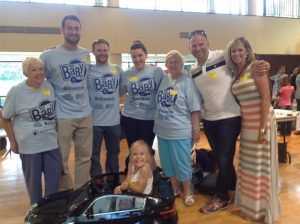Kiwanis Club helps children with spina bifida
Chronicle Media — August 9, 2016
Kiwanis members from Eureka provided a motorized vehicle to a child with spinal bifida. Pictured (left to right) are Nancy Aldridge, Eureka Greater Area Kiwanis Club, Joey Zisk, Jacob Kirkpatrick and Heather Willets from Northwestern University Prosthetics-Orthotics Center, Norma Foley, Eureka Greater Area Kiwanis Club, and B.J. and Vickie Aberle, parents of Nadia. In the car is Nadia Aberle. (Photo courtesy of Eureka Greater Area Kiwanis)
Many Parents can remember the time their baby took his or her first step. It’s a time of joy and amazement.
But for some children with spina bifida, experiencing that first step on their own may take a lot longer and may be more difficult without help.
Kiwanis Clubs in Illinois have long supported medical research into causes and treatment for children born with spina bifida, a condition where the spine is exposed at birth and in some cases, leaves a child paralyzed.
Eureka Greater Area Kiwanis recently participated in a special project designed to help toddlers with spina bifida become mobile on the playground. The special project is known as GoBabyGo.
The objective of GoBabyGo is to retrofit battery cars for toddlers who suffer from mobility problems. Children at the age of 2 who are paralyzed are not mobile and often have socialization problems.
In this project, cars are retrofitted so a toddler who may be paralyzed can become mobile on a playground with a fun car and begin a socializing with other children. It also begins to teach them at a very early age to use motorized equipment for mobility.
The idea began at University of Delaware in 2006 by pediatric researcher and designer Cole Galloway and Sunil Agrawal. The concept builds on the notion that all kids want to have fun and that they learn when they are having fun.
Since, then, Galloway has collaborated with engineers and fashion designers, with parents and grandparents, to provide mobility to kids who have trouble moving on their own.
“Fun is key here. It unlocks brain development and exploratory drive for the child, and ignites active, engaged play from adults and peers,” Galloway says. “When your main goal is mobility and socialization of young children and their families, you can’t ask for better collaborators than Barbie and Mater.”
The Kiwanis project was initiated by the Kiwanis Club of River Forest/Oak Park and Kiwanis member Dr. Arun Jayaraman, who is director of the Max Nader Center for Rehabilitation Technologies & Outcomes at the Rehabilitation Institute of Chicago.
The project expanded in collaboration with the Illinois Spina Bifida Association.
The Eureka Greater Area Kiwanis club on July 30 joined with eight other Kiwanis Clubs and a Key Club at Shriners Hospital for Children in Chicago, with assistance of therapists and engineers from both Shriners and the Rehabilitation Institute of Chicago, purchased and retrofitted 12 cars for some special kids.
“Our club purchased a car for Nadia Faith Aberle daughter of Vickie and B.J. Aberle of Washington. Nadia was very quick to learn to maneuver her car. Thanks to donations from Goodfied Bank, Heartland Bank and the Eureka Greater area Kiwanis Club we were able to purchase the car,” says Nancy Aldridge who attended the project.
— Kiwanis Club helps children with spina bifida —



